Serving in Nica-time: Day Five
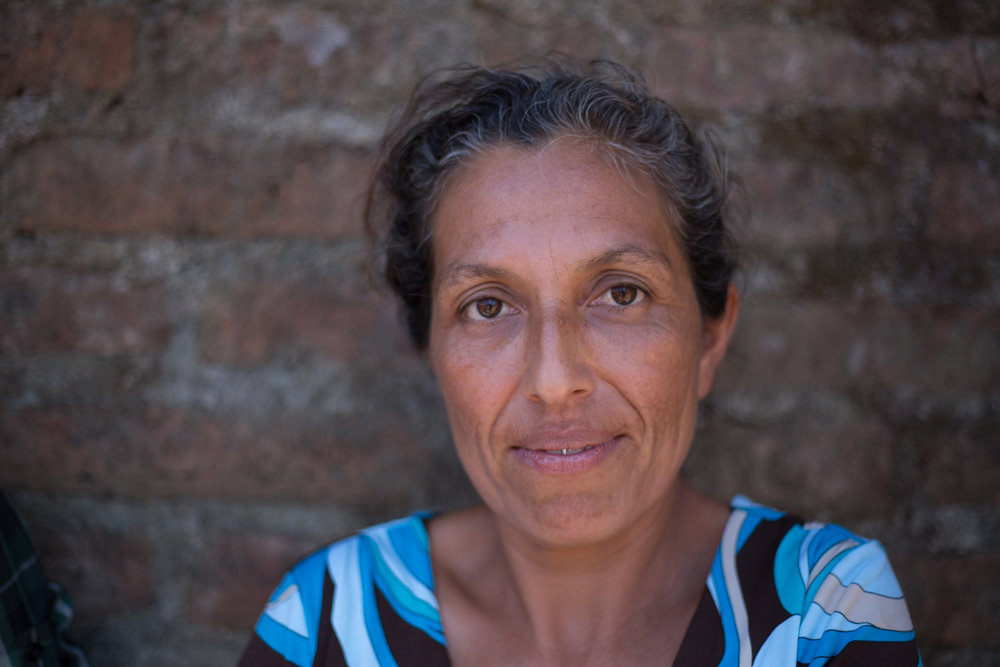 Day Five:
Day Five:
(Disclaimer: There are probably several mistakes and misspellings and errors of thought in these posts. By the end of the night, I'm about tuckered out, but I want to get my thoughts down before I go to sleep. It's 10:39 right now in Nicaragua as I'm posting this, which is 12:39 a.m. eastern time--my day started at 4:00 a.m,, which is 6:00 a.m. eastern time--the time I usually wake up at home. When I return from clinic at the end of each day, I try to upload the day's photos right away, but this little laptop takes a long time, and the internet service is working as hard as it can to post the pictures. It usually takes me most of the evening, and there's often other things happening that keep me from getting it all done before I collapse. Today, I got the bright idea that I would take my laptop and do my writing while everyone else is doing their jobs, but, alas, laptops are not allowed in clinics, and my dumb arthritis won't let me write longhand for more than a sentence or two. By the time I finally get all my thoughts down, I don't even want to think about going back and correcting my spelling mistakes. I hope you can see past them to the intent of what I'm trying to say.)

It's about noon and I'm sitting at the weight and height station just inside the large wooden door at Guadalupe Arriba. The door is swung open, and Chris is in front of me making balloon animals for the children, the sun streaming in and throwing this gorgeous golden light on their faces. Of course, the adults are interested, too. Last night, Chris practiced with the two large bags she ordered online before she came, hundreds of long balloons in "carnival colors," which she says aren't quite as bright as she had hoped they would be. It doesn't matter to the children. They're loving every minute of it. It looks like Chris is, too.
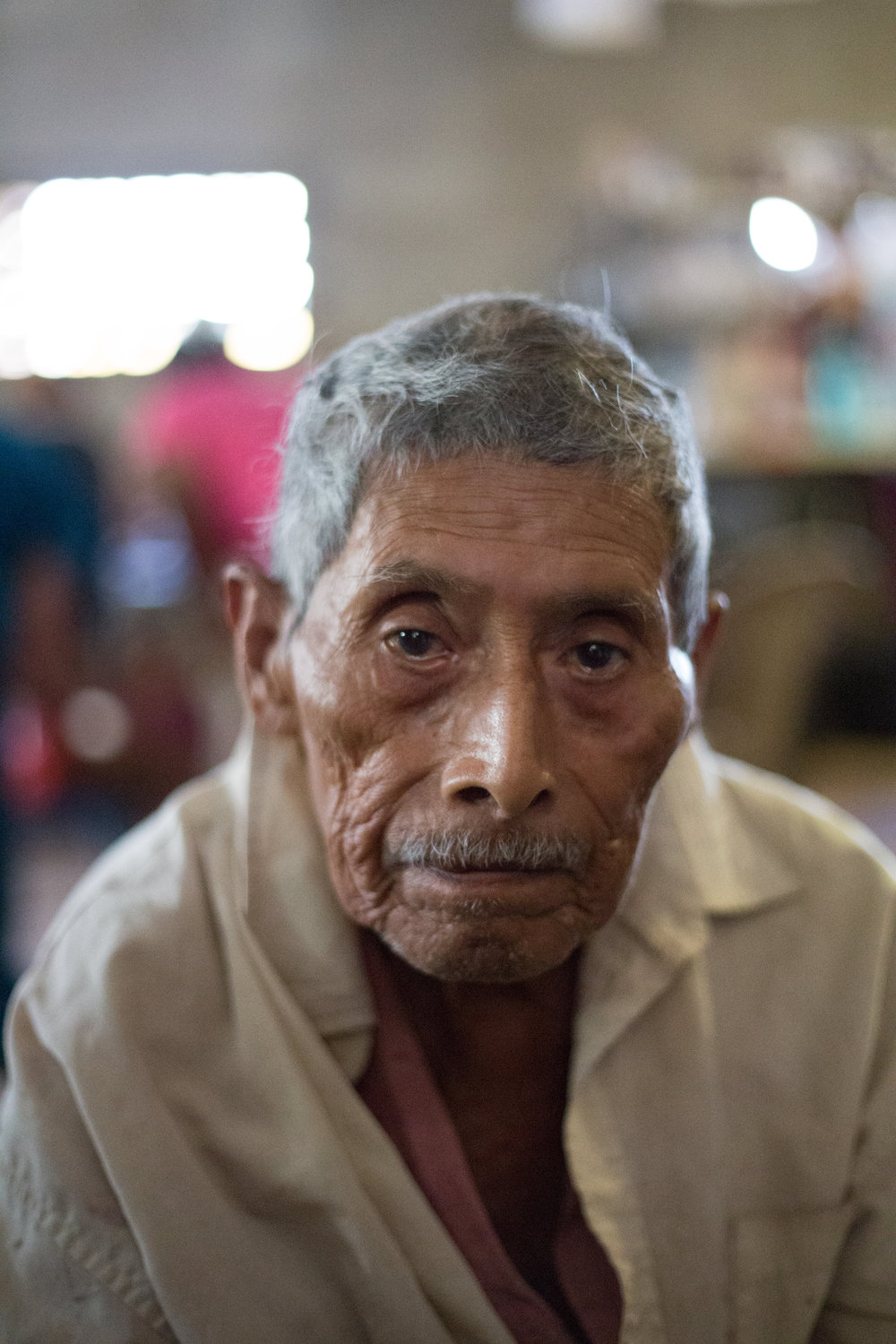
This is the third clinic day we've had since we've been in Nicaragua. Every day, every building, has a feel and character of its own. The way of speaking here, for instance, seems to be different from the other areas we've visited so far. The translators are having a little bit of a harder time understanding because the people talk so quietly. Nelson said it's likely they aren't used to having people visit from other places, so they're slow to speak. Most of them seem to have a hard time looking us strange visitors in the eye. They love having their photos taken, though, and I've learned to point to the lens and say, "¡Mira aquí, por favor!" While they often look so very, very serious in the photos, as soon as I turn the camera around and show them the result, they smile and laugh and nod and say, "Gracias," then point to their child or their mother or their friend and say, "¡Ahora ella!" or "¡Ahora él!" or "¡Mi hijo/hija!" Some of the children will lift a finger and say, "¡Aquí!" And then, the moment the lens is directed at them, they will strike a solemn pose and wait. When I take a photo of an older woman then show it to her, she will often laugh and cover her mouth. I try to tell each person that they're beautiful, or handsome, or that the picture is very good. The very elderly usually put their hand on my shoulder and start talking and talking. Today, Carlos, one of the translators, called me over because he thought I would like to take a photo of a 70-year-old man, Salvador, who was seeing one of the nurses. I took Salvador's photos, showed it to him, and told him he was "muy guapo." He started talking right away, so I asked the translator to ask him how he felt about getting his photo taken. He nodded and said he liked it very much, that he thought it was very good that I was taking pictures. I asked him if he liked seeing his own photo, and he said, yes. Yes, very much.
Being a person who loves communicating, who loves telling stories and, especially, listening to them, this trip has been quite a challenge for me. One of my favorite past times is asking questions, finding out a person's history and discovering the things that really matter to them. Here, I can't do that except for with my own team members. And that's wonderful, because I love hearing their stories ,too. But the people here have such amazing stories of hard work and love and loss and family, so it's frustrating to lack the language tools necessary to hear what they have to say.
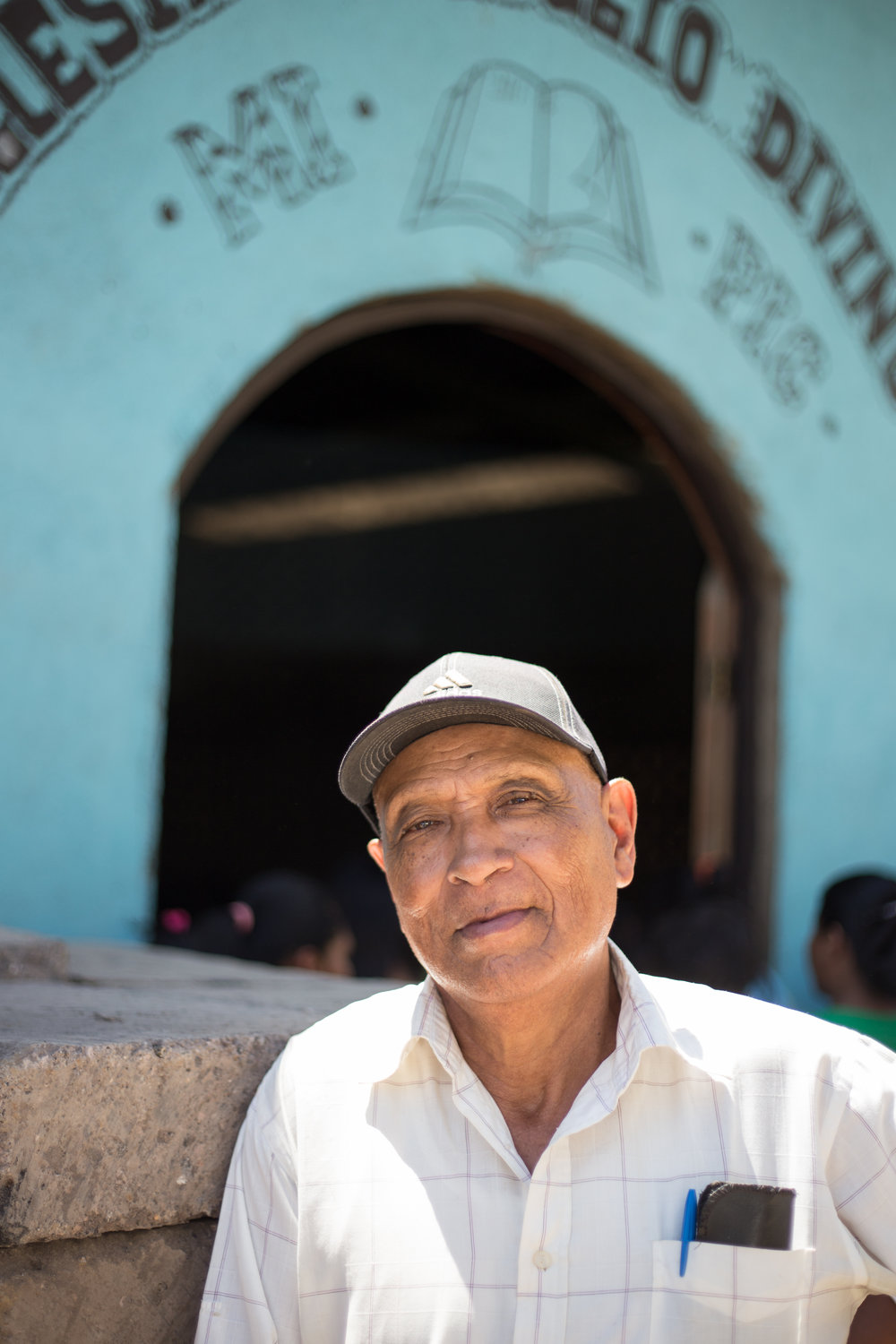
This morning, I met pastor Alberto. I offered the standard greeting, and he began speaking to me very quickly in Spanish. "No hablo español," I said, which was an improvement over yesterday when I was saying, "No habla español," which, as Jeff told me, means no Spanish is spoken here. This must have thrown the poor people I spoke with into a panic wondering how they were going to convey their medical concerns to this crew of Americans if no one spoke their language. I tried, with Alberto, to tell him my name, and to tell him Jaynie's name, and to tell him Lori's name, but he said he didn't understand. So we just stood beside each other in silence, not able to talk about the weather, or the beautiful church we were standing beside, or the precious baby playing beside us in the dirt. I know it's okay to simply stand in silence next to someone, but when you'd prefer to hear all about their life, their past, their faith, their pains and joys--it's frustrating.
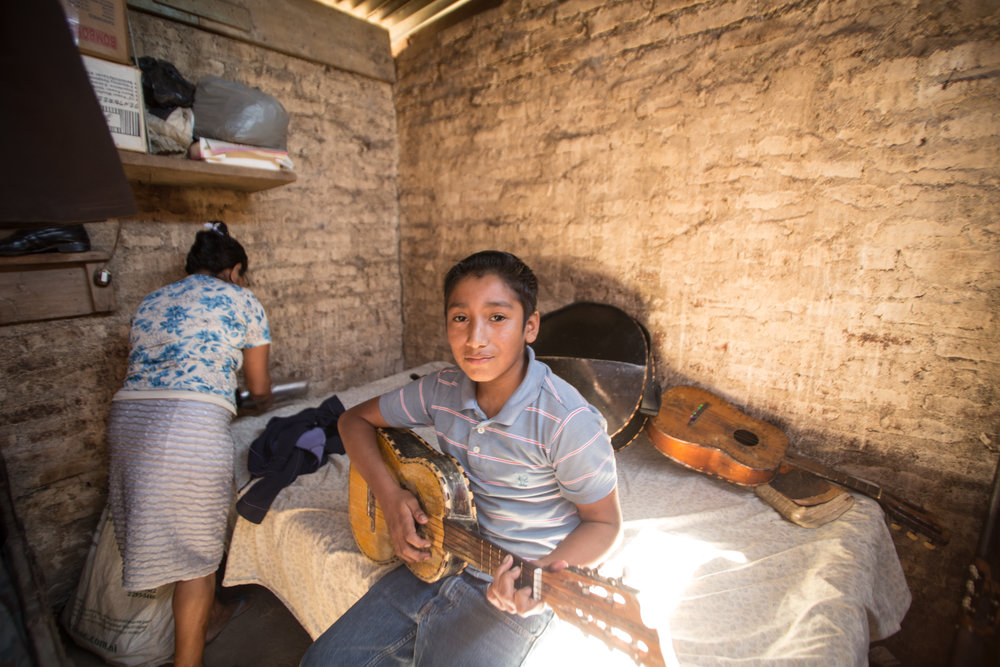
The ropa y zapatos room is in Alberto's room. When we arrived, there were two young children sitting on the bed in Alberto's room playing instruments that looked like guitars. Perry got a great video of the boy playing. A quick look around the room revealed several instruments--the two guitars, plus a tambourine and what looked like a big guitar when a rounded back. "¿Què es eso?" He told me what it was, but I couldn't understand, so I asked, "Is it a bass?" He looked at me blankly, of course, so I pantomimed playing a bass and tried to sound like one, too. "Boom, boom, boom?" "Si!" he said. "Si!" He played it for a minute, and, yep, sure enough, it was a bass.
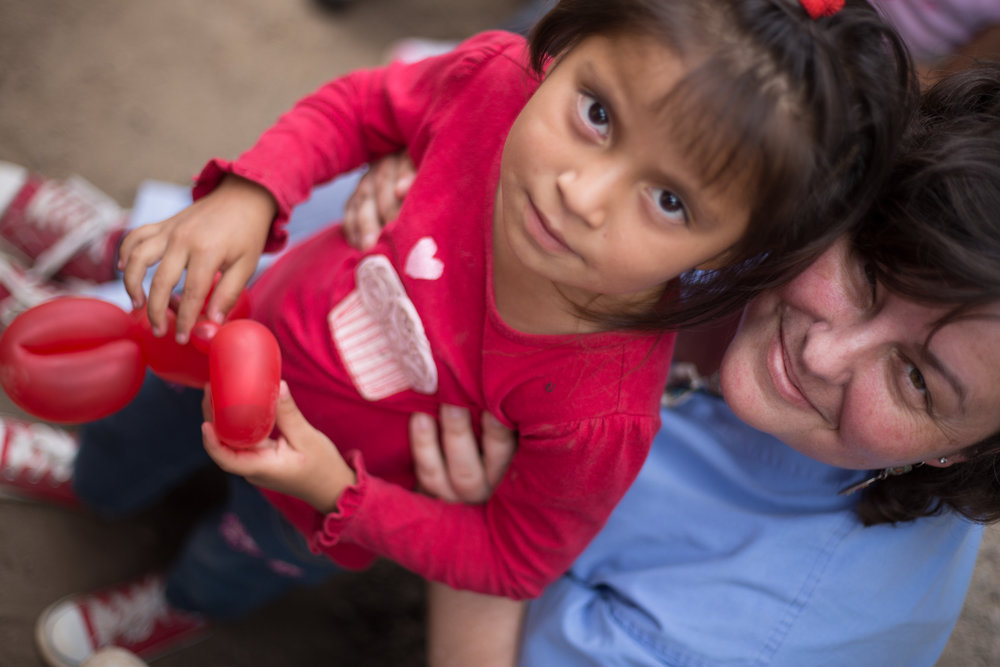
I met a little girl I called my "gemela con zapatos rojos," my twin with red shoes. She had bright red Converse tennis shoes on, just like I have been wearing to clinics. Though I could say little more than "zapatos rojos," it was fun to make even a small connection. She then taught me the names of all the colors for the shoes that her friends and sisters were wearing. I had Jaynie take a picture of our four red shoes together, and then I took a photo of her beautiful face.
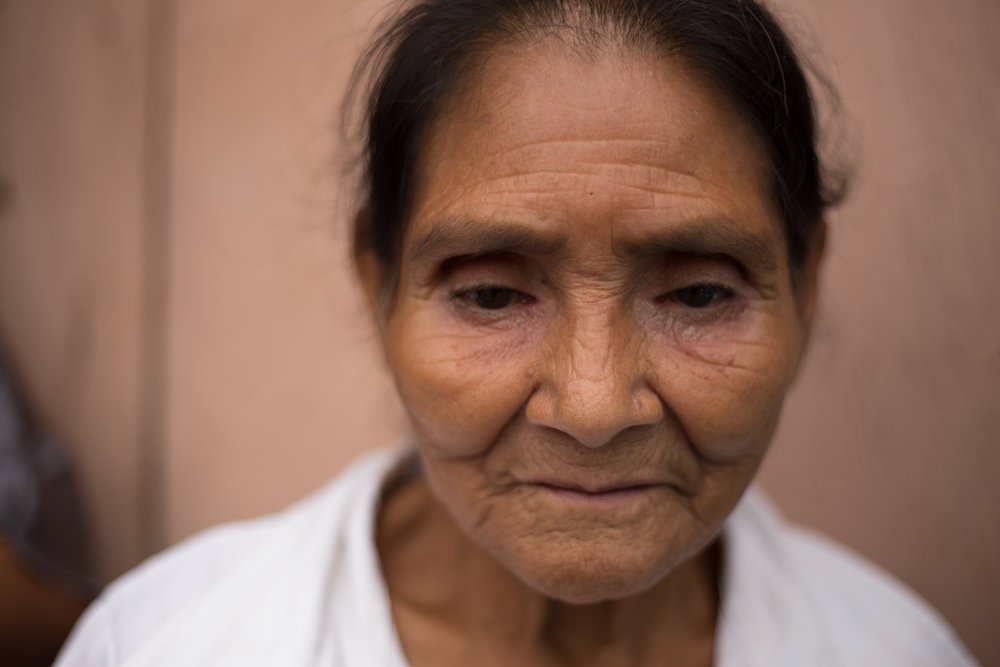
Several people who have seen the photos I've posted on Facebook have said that the people here are so beautiful and look healthy enough. Are they really in need? The answer is yes. Yes, they are. Here are a few things I've learned while I've been here, because I knew virtually nothing about Nicaragua before I came: It's not uncommon for people to lose loved ones--children, spouses, parents--to parasites. A woman I photographed yesterday named Ursula lost four children and a husband to parasites--or at least that's what she thinks happened. She can't know for sure because they had no reliable access to healthcare. Now she only has her young granddaughter and great granddaughter as family, but no way of providing for them because she can't see.
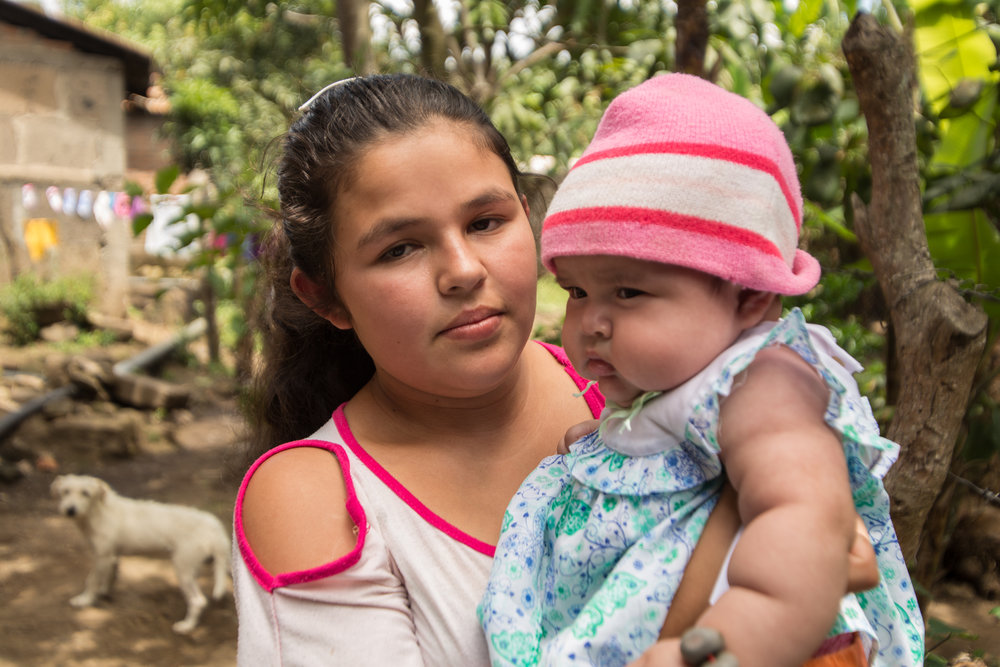
In Nicaragua, adolescent pregnancies account for 1 in 4 births nationally. On the first day of clinic, I held the baby of a young girl who looked to be no more than 12. She was alone--no man, no parents, no grandparents. The baby was wearing a rag covered in a pink grocery bag for a diaper. She was a very loving and protective mama. She held that baby close to her the whole day. When I held the baby for just a minute, she became very anxious and wanted her back. Her face was so sweet and round, she looked like a baby herself.
More than 30% of children have some degree of chronic malnutrition, and almost 10% suffer from severe malnutrition. During one clinic, Dr. Andy had concerns that a young girl was suffering from anemia, and he asked the mama if she had pollo in the house. No, no pollo. Tortillas? No, no tortillas. Each thing he would ask about, the answer was no. One little girl's face was so pale from anemia, and she wouldn't even speak or smile. Her mother said she barely ate and didn't care to drink, either. When asked if the little girl drank a "lot" of water during the day, the mama said, "Yes. She drinks one glass a day." Today, a young boy reluctantly told one of the care providers that he was unable to see the chalkboard in the classroom and that he doesn't see cars until they're upon him. The care provider said he was smart and got good grades, but without being able to see the board in class, he was essentially teaching himself. Consider this--more than 50% of the U.S. population wears contacts or glasses, but in rural Nicaragua, you rarely see a person with glasses, because they don't have access to eye care. Most of the country's income goes to the richest people in the country, while less than 15% goes to the poorest. The work the rural people do here is very difficult and labor intensive. Parents will often lie about their children's ages for them to work. A middle-aged woman at yesterday's clinic had been picking coffee beans since she was 12. Even so, the working people live on only about $1 per day. Some of the poorest people are elderly women who are the heads of their households, which is the case in about 1 in 3 households. And yet, very few women own the land they live on, and most work on land that will never belong to them. One woman Dr. Andy saw this week had such terribly debilitating rheumatoid arthritis in all of her joints--misshapen hands, swollen knees, pain in her elbows--that she lived in constant pain. If she had happened to have been born in the United States, she would likely have had a knee replacement. But here in Nicaragua, she can only hope to manage her pain. We had run out of arthritis medicine, too, though she was able to leave with ibuprofen to ease the pain. The people here have been handed so much political unrest, natural disaster, inadequate infrastructure, and little or no access to basic human necessities like clean water, education, employment, and healthcare. And so much of it has only to do with the fact that they were born here and not somewhere else. The place of their birth. That's it. That, in and of itself, becomes a major factor in their quality of life.

I'm not saying it's necessary to travel to a developing country to serve others. There are people within five minutes of me who are in need. But my feeling is this--if you feel pulled toward a place, if you feel a responsibility to it and to its people, if a particular geographic location captures your heart and tugs you back there again and again, then go. Be there. Do what you're skilled to do. Helping to meet basic human need is never a mistake, regardless of where it is.
The day is winding down now, and the last patients are being seen. Tomorrow will be our last clinic day. It's hard to believe, because it feels like we've just begun. It's so strange, because time does become virtually nonexistent here. Returning home and having a schedule and certain times you have to be certain places will be very strange. I'm not sure I'll be able to adjust again. I might just have to stay on Nica-time for the rest of my life. Lo siento, friends and family.
Much love now and more later from San Ramon, Nicaragua.
